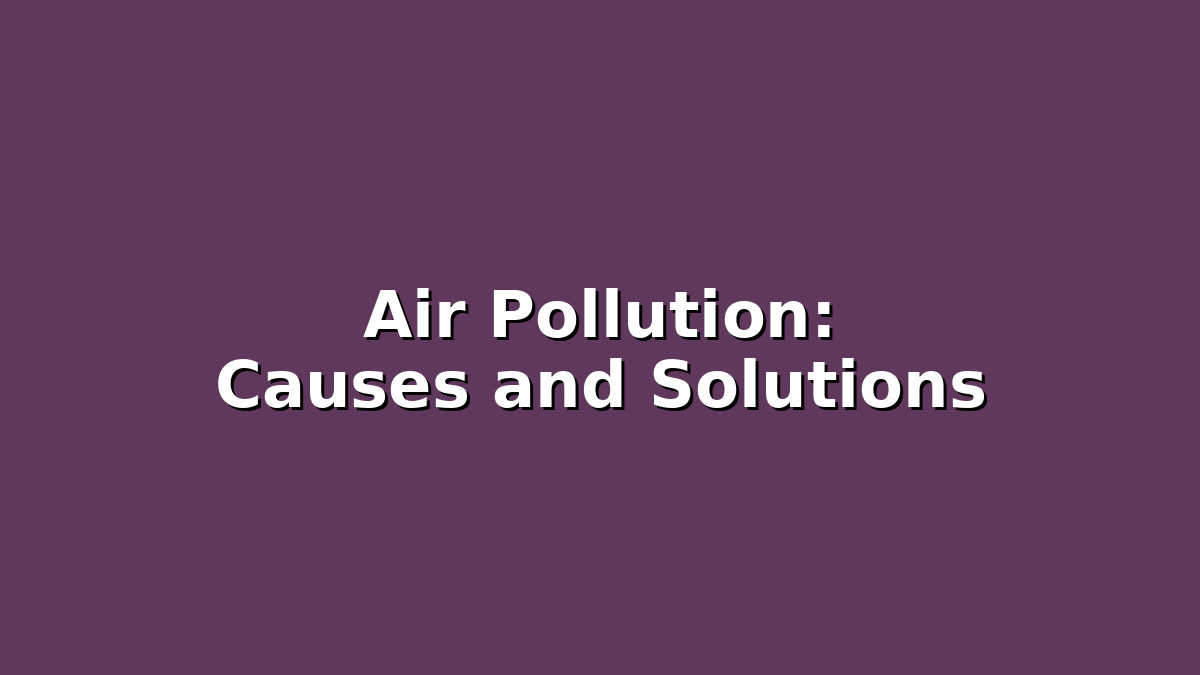Air pollution is a critical environmental issue that impacts not only the planet but also our daily lives, including the health and well-being of students like you. Understanding the causes of air pollution and exploring effective solutions is essential, especially if you are preparing for exams or looking for study tips. This knowledge can inspire you to take meaningful actions and stay motivated while studying, knowing you are contributing to a cleaner, healthier future.
In this article, we will explore the main causes of air pollution, discuss practical solutions, and offer study-related advice to help you stay focused and energized during exam preparation. Let’s dive in!
Understanding the Causes of Air Pollution
Air pollution happens when harmful substances, such as gases, dust, and smoke, contaminate the air we breathe. These pollutants can come from natural sources like volcanic eruptions, but human activities are the primary contributors. For students preparing for exams, it’s important to grasp these causes to connect your learning with real-world issues, making your study sessions more meaningful and engaging.
1. Industrial Emissions: Factories and power plants burn fossil fuels like coal and oil, releasing large amounts of carbon dioxide (CO2), sulfur dioxide (SO2), nitrogen oxides (NOx), and particulate matter into the air. These pollutants degrade air quality and contribute to respiratory problems.
2. Vehicle Exhaust: Cars, buses, and trucks emit pollutants such as carbon monoxide (CO), nitrogen oxides, and hydrocarbons. Increased traffic congestion in cities results in higher pollution levels, particularly affecting urban areas where many students live and study.
3. Burning of Biomass and Waste: In many places, people burn wood, crop residues, and garbage for cooking or heating. This releases smoke and particulate matter that pollutes the air and causes health hazards.
4. Construction and Dust: Construction sites generate dust and other particles that reduce air quality. These pollutants are often invisible but can irritate the lungs and cause allergies.
Study Tip: When learning about environmental topics like air pollution, try creating mind maps or diagrams linking causes to effects. Visual aids can help you retain complex information and make your study sessions more interactive.
Practical Solutions to Combat Air Pollution
Addressing air pollution requires collective action, but as a student, you can also contribute in small yet impactful ways. Understanding the solutions can empower you to make environmentally conscious decisions and improve your study environment.
1. Promoting Clean Energy: Switching from fossil fuels to renewable energy sources such as solar, wind, and hydroelectric power reduces harmful emissions. You might not control energy policies, but supporting clean energy initiatives or advocating for greener campuses can make a difference.
2. Using Public Transport or Biking: Reducing the number of vehicles on the road lowers pollution. Walking, biking, or using public transportation to get to school or campus not only helps the environment but also gives you physical exercise, which boosts brain function and improves concentration.
3. Reducing Waste Burning: Proper waste disposal and recycling can prevent the release of toxic smoke from burning garbage. Encourage your family and friends to adopt better waste management habits.
4. Green Spaces and Planting Trees: Trees absorb carbon dioxide and release oxygen, improving air quality. Participating in tree-planting drives or maintaining indoor plants can create a cleaner atmosphere around you and provide a calming study environment.
Study Tip: Try to incorporate short breaks during study sessions for outdoor activities like a brief walk or tending to plants. Fresh air and nature exposure help reduce stress and improve memory retention.
How Air Pollution Affects Students and How to Study Better Despite It
Air pollution can have direct effects on your health and academic performance. Poor air quality may cause headaches, fatigue, respiratory issues, and difficulty concentrating — all of which can hinder your exam preparation. Here’s how you can manage these challenges:
1. Create a Clean Study Space: If outdoor air quality is poor, study indoors in a well-ventilated room. Use air purifiers if possible, or keep windows closed during high pollution times. Maintaining cleanliness reduces allergens and dust that contribute to poor air quality.
2. Stay Hydrated and Eat Nutritiously: Drinking plenty of water helps flush out toxins from your body. Eating antioxidant-rich foods like fruits and vegetables can combat oxidative stress caused by pollution, boosting your immune system and brain function.
3. Practice Mindfulness and Deep Breathing: Stress and anxiety are common during exams, and air pollution can exacerbate these feelings. Mindfulness exercises and deep breathing techniques can help calm your mind and improve oxygen intake, enhancing focus and relaxation.
4. Plan Study Sessions According to Air Quality: Use local air quality indexes to schedule outdoor activities or breaks when pollution levels are lower. This reduces exposure and helps maintain your energy throughout the day.
Study Tip: Keep a pollution diary to track how different air quality levels affect your mood and concentration. This awareness can guide you in adjusting your study habits for optimal performance.
Conclusion
Air pollution is a pressing global problem, but by understanding its causes and solutions, you as a student can play a vital role in combating it. Connecting your environmental knowledge with your study habits not only makes learning more relevant but also supports your health and academic success. Remember, small actions—like using public transportation, supporting clean energy, and creating a healthy study space—add up to significant changes.
Stay motivated, prioritize your well-being, and keep the bigger picture in mind: every effort you make towards reducing air pollution contributes to a cleaner, healthier world for you and future generations. Good luck with your exams, and breathe easy knowing you’re making a positive difference!

Responses